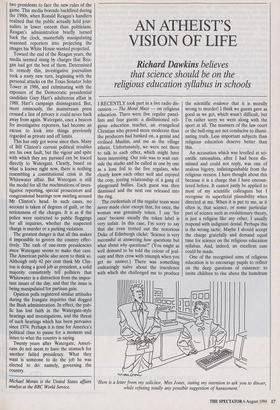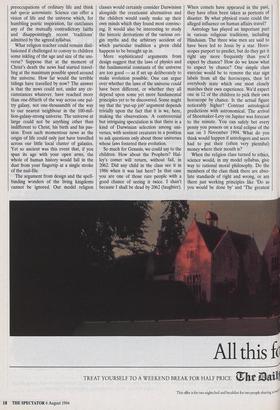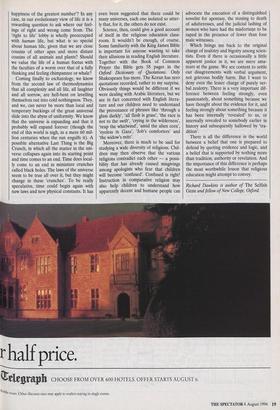AN ATHEIST'S VISION OF LIFE
Richard Dawkins believes
that science should be on the religious education syllabus in schools
I RECENTLY took part in a live radio dis- cussion — The Moral Maze — on religious education. There were five regular panel- lists and four guests: a disillusioned reli- gious education teacher, an evangelical Christian who proved more moderate than the producers had banked on, a genial and civilised Muslim, and me as the village atheist. Unfortunately, we were not there to talk to each other, which might have been interesting. Our role was to wait out- side the studio and be called in one by one as a lone foil to the five regulars, who clearly knew each other well and enjoyed the cosy, jeering relationship of a gang of playground bullies. Each guest was then dismissed and the next one released into the ring.
The credentials of the regular team were never made clear except that, for once, the woman was genuinely token. I say 'for once' because usually the token label is very unfair. In this case, I'm sorry to say that she even trotted out the notorious Duke of Edinburgh cliché: 'Science is very successful at answering how questions but what about why questions?' (You might as well demand to be told the colour of jeal- ousy and then crow with triumph when you get no answer.) There was something endearingly naïve about the truculence with which she challenged me to produce the scientific evidence that it is morally wrong to murder! I think we guests gave as good as we got, which wasn't difficult, but I'm rather sorry we went along with the sport at all. The manners of the law court or the bull-ring are not conducive to illumi- nating truth. Less important subjects than religious education deserve better than this.
An accusation which was levelled at sci- entific rationalists, after I had been dis- missed and could not reply, was one of zealous bigotry, indistinguishable from the religious version. I have thought about this because it is a charge that I have encoun- tered before. It cannot justly be applied to most of my scientific colleagues but I recognise its superficial plausibility when directed at me. When it is put to me, as it often is, that science, or some particular part of science such as evolutionary theory, is just a religion like any other, I usually respond with indignant denial. Perhaps this is the wrong tactic. Maybe I should accept the charge gratefully and demand equal time for science on the religious education syllabus. And, indeed, an excellent case could be made.
One of the recognised aims of religious education is to encourage pupils to reflect on the deep questions of existence: to invite children to rise above the humdrum 'Here is a letter from my solicitor, Miss Jones, stating my intention to ask you to dinder, while refuting totally any possible suggestion of harassment.' preoccupations of ordinary life and think sub specie aeternitatis. Science can offer a vision of life and the universe which, for humbling poetic inspiration, far outclasses any of the mutually contradictory faiths and disappointingly recent 'traditions' admitted by the agreed syllabus.
What religion teacher could remain disil- lusioned if challenged to convey to children some inkling of the age and size of the uni- verse? Suppose that at the moment of Christ's death the news had started travel- ling at the maximum possible speed around the universe. How far would the terrible tidings have travelled by now? The answer is that the news could not, under any cir- cumstances whatever, have reached more than one-fiftieth of the way across one pal- try galaxy, not one-thousandth of the way to our nearest neighbour in the 100-mil- lion-galaxy-strong universe. The universe at large could not be anything other than indifferent to Christ, his birth and his pas- sion. Even such momentous news as the origin of life could only just have travelled across our little local cluster of galaxies. Yet so ancient was this event that, if you span its age with your open arms, the whole of human history would fall in the dust from your fingertip at a single stroke of the nail-file.
The argument from design and the spell- binding wonders of the living kingdoms cannot be ignored. Our model religion classes would certainly consider Darwinism alongside the creationist alternatives and the children would easily make up their own minds which they found most convinc- ing. It would also be interesting to study the historic derivations of the various ori- gin myths and the arbitrary accident of which particular tradition a given child happens to be brought up in.
More sophisticated arguments from design suggest that the laws of physics and the fundamental constants of the universe are too good — as if set up deliberately to make evolution possible. One can argue over whether the laws of the universe could have been different, or whether they all depend upon some yet more fundamental principles yet to be discovered. Some might say that the 'put-up job' argument depends trivially upon the fact that it is we, here, making the observations. A controversial but intriguing speculation is that there is a kind of Darwinian selection among uni- verses, with sentient creatures in a position to ask questions only about those universes whose laws fostered their evolution.
So much for Genesis, we could say to the children. How about the Prophets? Hal- ley's comet will return, without fail, in 2062. Did any child in the class see it in 1986 when it was last here? In that case you are one of those rare people with a good chance of seeing it twice. I shan't because I shall be dead by 2062 (laughter). When comets have appeared in the past, they have often been taken as portents of disaster. By what physical route could the alleged influence on human affairs travel?
Astrology has played an important part in various religious traditions, including Hinduism. The three wise men are said to have been led to Jesus by a star. Horo- scopes purport to predict, but do they get it right any more frequently than you'd expect by chance? How do we know what to expect by chance? One simple class exercise would be to remove the star sign labels from all the horoscopes, then let everybody state which one most closely matches their own experience. We'd expect one in 12 of the children to pick their own horoscope by chance. Is the actual figure noticeably higher? Contrast astrological predictions with astronomical. The arrival of Shoemaker-Levy on Jupiter was forecast to the minute. You can safely bet every penny you possess on a total eclipse of the sun on 3 November 1994. What do you think would happen if astrologers and seers had to put their (often very plentiful) money where their mouth is?
When the religion class turned to ethics, science would, in my model syllabus, give way to rational moral philosophy. Do the members of the class think there are abso- lute standards of right and wrong, or are there just working principles like 'Do as you would be done by' and 'The greatest happiness of the greatest number'? In any case, in our evolutionary view of life it is a rewarding question to ask where our feel- ings of right and wrong come from. The `right to life' lobby is wholly preoccupied with human life, but what is so special about human life, given that we are close cousins of other apes and more distant cousins of all animals and plants? Should we value the life of a human foetus with the faculties of a worm over that of a fully thinking and feeling chimpanzee or whale?
Coming finally to eschatology, we know from the second law of thermodynamics that all complexity and all life, all laughter and all sorrow, are hell-bent on levelling themselves out into cold nothingness. They, and we, can never be more than local and temporary buckings of the great universal slide into the abyss of uniformity. We know that the universe is expanding and that it probably will expand forever (though the end of this world is nigh, in a mere 60 mil- lion centuries when the sun engulfs it). A possible alternative Last Thing is the Big Crunch, in which all the matter in the uni- verse collapses again into its starting point and time comes to an end. Time does local- ly come to an end in miniature crunches called black holes. The laws of the universe seem to be true all over it, but they might change in these 'crunches'. To be really speculative, time could begin again with new laws and new physical constants. It has even been suggested that there could be many universes, each one isolated so utter- ly that, for it, the others do not exist.
Science, then, could give a good account of itself in the religious education class- room. It wouldn't be enough, of course. Some familiarity with the King James Bible is important for anyone wanting to take their allusions in reading English literature. Together with the Book of Common Prayer the Bible gets 58 pages in the Oxford Dictionary of Quotations. Only Shakespeare has more. The Koran has zero quotations recorded, rather to my surprise. Obviously things would be different if we were dealing with Arabic literature, but we are in fact concerned with English litera- ture and our children need to understand the provenance of phrases like 'through a glass darkly', `all flesh is grass', 'the race is not to the swift', 'crying in the wilderness', `reap the whirlwind', 'amid the alien corn', `eyeless in Gaza', 'Job's comforters' and `the widow's mite'.
Moreover, there is much to be said for studying a wide diversity of religions. Chil- dren may then observe that the various religions contradict each other — a possi- bility that has already caused misgivings among apologists who fear that children will become 'confused'. Confused is right! Instruction in comparative religion may also help children to understand how apparently decent and humane people can advocate the execution of a distinguished novelist for apostasy, the stoning to death of adulteresses, and the judicial lashing of women who have had the misfortune to be raped in the presence of fewer than four male witnesses.
Which brings me back to the original charge of zealotry and bigotry among scien- tists. Even if there is occasionally a little apparent justice in it, we are mere ama- teurs at the game. We are content to settle our disagreements with verbal argument, not grievous bodily harm. But I want to deny even the lesser charge of purely ver- bal zealotry. There is a very important dif- ference between feeling strongly, even passionately, about something because we have thought about the evidence for it, and feeling strongly about something because it has been internally 'revealed' to us, or internally revealed to somebody earlier in history and subsequently hallowed by 'tra- dition'.
There is all the difference in the world between a belief that one is prepared to defend by quoting evidence and logic, and a belief that is supported by nothing more than tradition, authority or revelation. And the importance of this difference is perhaps the most worthwhile lesson that religious education might attempt to convey.
Richard Dawkins is author of The Selfish Gene and fellow of New College, Oxford.




















































 Previous page
Previous page